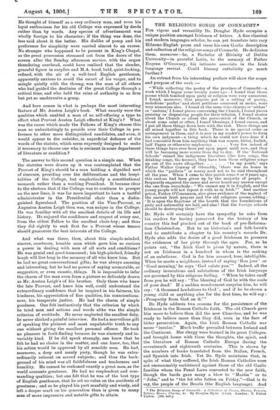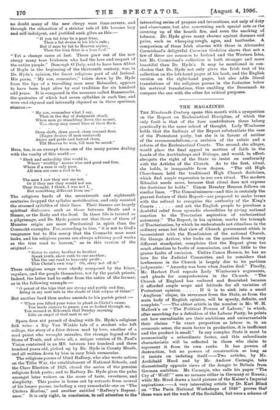THE RELIGIOUS SONGS OF CONNACHT.* FOR vigour and versatility Dr.
Douglas Hyde occupies a unique position amongst Irishmen of letters. A fine classical and modern languages scholar, he can yet translate into racy Hiberno-English prose and verse his own Gaelic description and collection of the religious songs of Connacht. He dedicates them, moreover—he, a Bachelor of Divinity of Dublin University—in graceful Latin, to the memory of Father Eugene O'Growney, his intimate associate in the Irish language revival. Could literary catholicity go much further P An extract from his interesting preface will show the scope and purpose of the work :-
"While collecting the poetry of the province of Connacht—a work which I began some twenty years ago—I found that those poems which touched upon piety or religion were very numerous. I found, moreover, that prayers put in a setting of poetry, melodious paidirs' and short petitions composed in metre, were very numerous also. I found at the same time charms or 'orthas' or amhras,' I found pieces concerning the Church, I found pieces praising or dispraising people for their religion, I found stories about the Church or about the persecution of the Church, or about some saint or other, I found blessings, I found curses, and I put all these things down hero with the rest. These things are all mixed together in this book. There is no special order or arrangement in them, and it is now in my reader's power to form his own judgment—a thing which he could not have done if I had concealed from him anything that was coarse, bitter, foolish, half Pagan or otherwise unpleasing Very few indeed of these things have ever been put upon paper until now, and they will be becoming more scarce from day to day. If the ' National Schools' ruined the indigenous literature (the love songs, the drinking songs, the keenes), they have torn these religious songs
up out of the roots altogether In my youth,' says Father Walter Conway of Glenaddy, there was no house in which the "paidirin" or rosary used not to be said throughout all the year. When I came to this parish some 8 or 9 years ago, this custom had been given up by the majority of people. I frequently enquired the cause and never heard any answer except the one from everybody : " We cannot say it in English, and the young people will not repeat it with us in Irish." And another priest, Father O'Concannon, also gives evidence of the neglect of the ancient Irish prayers and the old religious poems, adding : 'It is upon the flagstone of the hearth that the foundations of piety and nationality are laid, and alas ! that the foreign schools should be destroying them !'" Dr. Hyde will certainly have the sympathy he asks from his readers for having preserved for the history of his country this leaf plucked out of the book of pre-Reforma- tion Christendom: But to an historian's and folk-lorist's zeal to contribute a chapter to his country's records Dr. Hyde also adds the desire of a good Irishman to preserve the evidences of her piety through the ages. For, as be points out, "the Irish Gael is pious by nature, there is not an Irishman in a hundred in whom is the making of an unbeliever. God is for him assured, true, intelligible. When he meets a neighbour, instead of saying Bon jour' or 'Good morning,' he says God salute you." Indeed, all the ordinary invocations and salutations of the Irish language are governed by this religious feeling. "When he takes snuff from you he will say : The blessing of God be with the souls of your dead.' If a sudden wonderment surprise him, he will cry: A thousand laudations to God ' ; and if he be shown a young child or anything else for the first time, he will say : Prosperity from God on it.'"
Dr. Hyde adduces two reasons for the persistence of the Irishman in the Roman Catholic faith. The old Church gave him more to believe than did the new Churches, and he was ready to believe more than they did, even in the face of bitter persecution. Again, the Irish Roman Catholic was never "insular." Much traffic prevailed between Ireland and the Continent. Her clergy were trained in its great Colleges. and brought home with them the thoughts, the spirit, and the literature of Roman Catholic Europe during the
seventeenth and eighteenth centuries. This is shown by the numbers of books translated from the Italian, French,
and Spanish into Irish. Yet Dr. Hyde maintains that, in spite of what they suffered, the Irish Roman Catholics were not unreasonably embittered against those of the old Gaelic families whom the Penal Laws converted to the new faith, though the bards gave many a blow to "Martin" or to "John," and to "the lot who fatten on Friday,"—that is to say, the people of the Bearla (the English language). And
• The Religious Songs of Connacht: a Collection of Poems, Stories, Prarers, Satires, Ronne, Charms, ,te. By Douglas ilydo. 2 vols. London: T. Fisher Uuwin. Lies. net.] no doubt many of the new clergy were time-servers, and through the relaxation of a stricter rule of life became lazy and self-indulgent, and justified such gibes as this :— " If you fat friar be a poor friar, Then a fat desire is his life's rule ; But if man by fat to Heaven aspire, Then the lean friar is a lean fool !"
"Yet a change came at last. There grew out of the new clergy many true Irishmen who had the love and respect of the entire people." Donough O'Daly, said to have been Abbot of Boyle in the beginning of the thirteenth century, was, in Dr. Hyde's opinion, the finest religious poet of old Ireland.
His poem, "My son, remember," taken down by Dr. Hyde from the lips of a travelling man near Belmullet, appears
to have been kept alive by oral tradition for six hundred odd years. It is composed in the measure called Ranneeacht, the quatrains of which had seven syllables in each line, and were end-rhymed and internally rhymed as in these specimen stanzas:— "My son, remember what I say, That in the day of Judgment shock, When men go stumblinr, down the mount, Tl.e sheep may count ihee of their flock.
. . ..... . . Shun sloth, shun greed, shun sensual fires, (Eager desires of men enslaved) Anger and pride and hatred shun,
Till Heaven be won, till man be saved."
Here, too, is an excerpt from one of the many poems dealing with the vanity of this world :— " Sleek and unhealthy this world is,
Where 'wealthy' means wise and good and free, Where if a man is only poor, All men are sure a fool is he.
The men I saw they saw me not,
Or if they saw they would not see. They thought, I think, I was not I, But something different from me."
The religious bards of the seventeenth and eighteenth
centuries dropped the syllabic metrification, and only counted the stressed syllables of their lines. Their themes are largely spiritual dialogues, such as those between Death and a Sinner, or the Body and the Soul. In these life is treated as a pilgrimage, and Dr. Hyde points out that those of them of Munster origin are more Puritanical in spirit than the Connacht examples. For, according to him, "it is not to God's vengeance but to His mercy that the Connacht man most looks, and his religious poems are always advising good works as the true road to heaven," as in this version of the
original :—
"Sister to sister, brother to brother
Speak truth, show ruth to one another; This the one road to heavenly profit ; This Christ's own way ! Oh, stray not off it."
These religious songs were chiefly composed by the friars,
regulars, and the people themselves, not by the parish priests. Indeed, the latter had to suffer from the satire of the former, as in the following example :—
" 0 priest of the hips that are strong and portly and fine, Bring in my soul safe in the shade of that corpus of thine!"
But another bard thus makes amends to his parish priest :—
" When you lifted your voice to plead in Christ's cause, You made sinners to pause, you so looked through us, You seemed in Kilcornin that Sunday morning Like an angel of God sent to us."
Space does not permit of dealing with Dr. Hyde's religious folk tales : a Rip Van Winkle tale of a student who left college, the story of a friar driven mad by love, another of a mad priest who wrought miracles, the strange legend of the Stone of Truth, and above all, a unique version of St. Paul's Vision contained in an MS. between two hundred and three hundred years old, picked up by Dr. Hyde in County Meath, and all written down by him in racy Irish vernacular.
The religions poems of blind Raftery, who also wrote satires on the Tithe War, the establishment of National Schools, and the Clare Election of 1828, closed the series of the genuine religious Irish poets; and to Raftery Dr. Hyde gives the palm amongst later writers on the score of taste, sweetness, and simplicity. This praise is borne out by extracts from several of his longer poems, including a very remarkable one on "The Cholera Morbus," and another entitled "Raftery's Repent- ance." It is only right, in conclusion, to call attention to the
interesting series of prayers and invocations, not only of duty and observance, but also concerning such special acts as the covering up of the hearth fire, and even the smoking of tobacco. Dr. Hyde gives many charms against diseases and pains, such as whooping-cough, ague, and. toothache., A; comparison of these Irish charms with those in Alexander. Carmichael's delightful Germ lea Gadelica shows that not a few of these are common to Ireland and the Western Isles,. but Mr. Carmichael's collection is both stranger and more beautiful than Dr. Hyde's. It may be mentioned in con- clusion that Dr. Hyde not only gives the Irish text of his collection on the left-hand pages of his book, and the English version on the right-band pages, but also adds literal translations of the religious poems in the footnotes below his metrical translations, thus enabling the Sassenach to compare the one with the other for critical purposes.







































 Previous page
Previous page